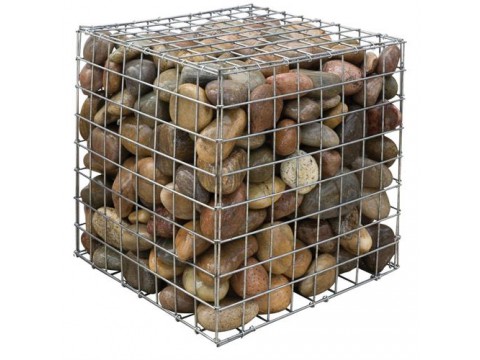Gabions are rectangular cages made from hexagonal double-twisted wire mesh filled with appropriately sized stones or quarry rocks. The mild tensile steel wire used in construction is class A galvanized per SABS 675 of 1993 standards. For enhanced protection, the galvanized wire can be coated with a 0.5 mm thick layer of PVC (polyvinyl chloride). This coating improves resistance against corrosion, particularly in harsh environments.
The gabions are divided into separate compartments using diaphragms, which are mesh panels spaced at 1-meter intervals for improved strength and stability. This design allows the structure to withstand shifts and adjustments in the foundation or terrain.
Common Sizes
-
Standard Basket Sizes
Width: 1 m
Length: 1 m to 4 m
Height: 0.5 m, 1 m -
Mesh Opening Sizes
50 x 50 mm
60 x 80 mm
80 x 100 mm
100 x 120 mm -
Wire Diameter
Ranges from 2 mm to 8 mm
Customization Capabilities
Gabions can be manufactured in a variety of shapes and sizes, and wire specifications can be adjusted to meet different project requirements:
-
Wire Diameter
Customizable wire thickness between 2 mm and 8 mm allows for increased or decreased structural strength as needed. -
Coating Options
Besides galvanization, gabion wire can be coated with PVC for added corrosion resistance. Available in different colors to blend with the environment or create a specific aesthetic. -
Mesh Size and Basket Dimensions
Mesh sizes can be adjusted to suit specific stone sizes or project needs. Basket lengths can vary from 0.5 m to 6 m, and heights can be customized.
Applications and Advantages
-
Mass-Gravity and Retaining Walls
Gabions are perfect for stabilizing slopes or creating retaining structures due to their strength and permeability. -
River and Canal Structures
Suitable for erosion control and riverbank stabilization. -
Rockfall Protection
Prevents loose rocks from causing damage or injury by catching them in the netted structure. -
Architectural and Landscaping
Offers aesthetic appeal while maintaining structural integrity. -
Defense and Security
Useful for building fortified bunkers or protective walls due to its resilience to blast impact.
Advantages
- Flexible and Durable: Adjusts to settlement without compromising structure.
- Permeable: Prevents water buildup, reducing pressure behind the wall.
- Economical: Uses locally available materials and requires little maintenance.
- Environmentally Friendly: Supports vegetation growth, blending with the natural environment.








